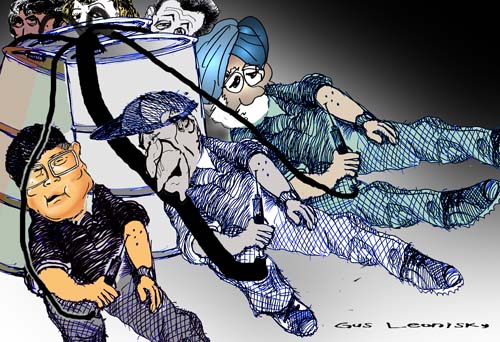Search
Recent comments
- be brave, albo....
2 hours 8 min ago - epstein class....
3 hours 13 min ago - in writing....
3 hours 24 min ago - hoped....
5 hours 24 min ago - murdering kids....
6 hours 25 min ago - saving....
6 hours 53 min ago - a speech never made....
20 hours 24 min ago - wardonald...
21 hours 57 min ago - MAGA fools
1 day 7 hours ago - the ugliest excuse to go to war.....
1 day 17 hours ago
Democracy Links
Member's Off-site Blogs
doped .....

Nodding his head to the disco music blaring out of his car's nine speakers, Zhang Linsen swings the shiny, black Hummer H2 out of his company's gates and on to the spacious four-lane road.
Running a hand over his closely shaved head, Zhang scans the expanse of high-end suburban offices and villas that a decade ago was just another patch of farmland outside of Shanghai.
To his left is a royal blue sedan with a couple and a baby, in front of him a lone young woman being chauffeured in a van. 'In China, size matters,' says Zhang, the 44-year-old founder of a media and graphic design company. 'People want to have a car that shows off their status in society. No one wants to buy small.' Zhang grasps the wheels of his Hummer, called 'hanma' or 'fierce horse' in Chinese, and hits the accelerator.
Car ownership in China is exploding, and it's not only cars but also sport-utility vehicles, pickup trucks and other gas-guzzling rides.
Elsewhere in the world, the popularity of these vehicles has tumbled as the cost of oil has soared. But in China, the number of SUVs sold rose 43 percent in May compared with the previous year, and full-size sedans were up 15 percent. Indeed, China's demand for gas is much of the reason for the dramatic run-up in global oil prices.
China alone accounts for about 40 percent of the world's recent increase in demand for oil, burning through twice as much now as it did a decade ago.
Fifteen years ago, there were almost no private cars in the country. By the end of last year, the number had reached 15.2 million. There are now more Buicks -- the venerable, boat-like American luxury car of years past -- sold in China than in the United States.
Demand for Hummers has been so strong that starting this year, Chinese consumers can buy a similar military-style vehicle called the Predator at more than 25 new dealerships.- By Gus Leonisky at 28 Jul 2008 - 9:57pm
- Gus Leonisky's blog
- Login or register to post comments
talking turkey
July 28, 2008
Fuel Subsidies Overseas Take a Toll on U.S.
By KEITH BRADSHER
JAKARTA, Indonesia — To understand why fuel prices in the United States have soared over the last year, it helps to talk to the captain of a battered wooden freighter here.
He pays just $2.30 a gallon for diesel, the same price Indonesian motorists pay for regular gasoline. His vessel burns diesel by the barrel, so when the government prepared for a limited price increase this spring, he took to the streets to protest.
“If the government increases the price of fuel any more, my business will collapse totally,” said the boat captain, Sinar, who like many Indonesians uses only one name.
From Mexico to India to China, governments fearful of inflation and street protests are heavily subsidizing energy prices, particularly for diesel fuel. But the subsidies — estimated at $40 billion this year in China alone — are also removing much of the incentive to conserve fuel.
The oil company BP, known for thorough statistical analysis of energy markets, estimates that countries with subsidies accounted for 96 percent of the world’s increase in oil use last year — growth that has helped drive prices to record levels.
In most countries that do not subsidize fuel, high prices have caused oil demand to stagnate or fall, as economic theory says they should. But in countries with subsidies, demand is still rising steeply, threatening to outstrip the growth in global supplies.
President Bush warned about the effects of subsidies on July 15. “I am discouraged by the fact that some nations subsidize the purchases of product, like gasoline, which, therefore, means that demand may not be causing the market to adjust as rapidly as we’d like,” he said.
--------------------
President Bush talks turkey... His subsidies to the farming sector in the US also destroys many economies in the world. No "market forces" there... But the kettleBush is blacker than... He should say nothing.